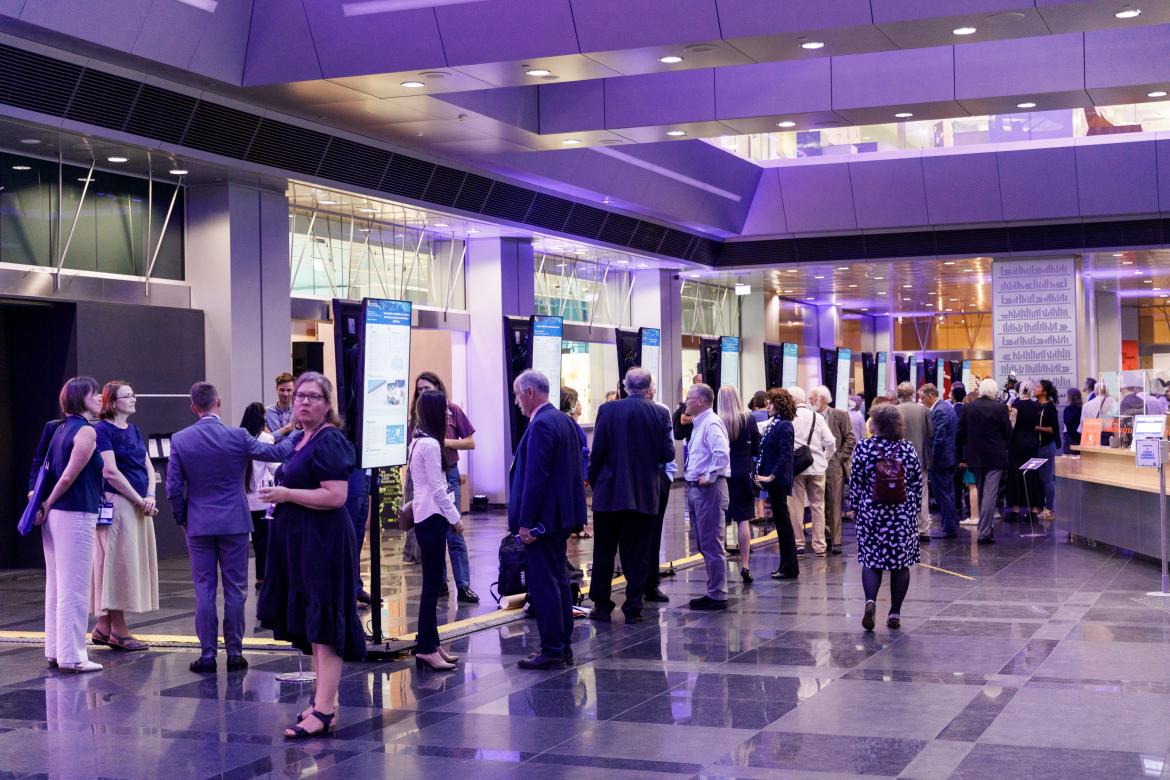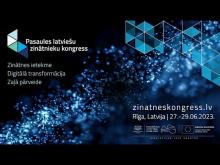
Congress Summary
September 18, 2023
With five years to go until the next – the 6th World Congress of Latvian Scientists – one is prompted to ask: is this a long time or a short time? On the one hand, I am inclined to say that it is a short time and that time flies quickly. However, when one considers events during the past five years in the realm of scientific development, I am prompted to say that it is quite hard to predict what awaits us and what we are going to discuss at the next congress. Despite this, during the concluding discussion, the scientists responsible for all three of the congress's main topics outlined the future trends that we will encounter in practice and discuss when we meet next time.
One subject increasingly on the minds of the public as well as scientists is AI. There is no question that this issue will assume omnipresent place on our agenda' "We are definitely going to be talking about how to find a place for humans in the world of Artificial Intelligence," asserts Acting Vice-Rector of Sciences of Riga Technical University (RTU) Professor Dr. sc. Eng. Gatis Bažbauers. "Historically, we have passed through several stages of development. We replaced the first phase of the industrial revolution with energy, which precipitated the climate changes of today. Next we had the automation of manufacturing processes, when factories no longer required so much manual work. And now we have the third wave - the automation of intellectual work. And people are going to have to secure a foothold for themselves and understand how to organise public life." Meanwhile, Director of the Public Health Institute at Riga Stradinš University, Associate Professor Anda Ķivīte-Urtāne stresses that in five years we will know a lot more about artificial intelligence and from a range of disciplines, "Then perhaps the topic of 'Should we be afraid of artificial intelligence?" will be relevant. However, this is what one of the panels already concluded this year." Professor Jānis Grabis, Head of RTU's Department of Management Information Technology, adds that, "We must continue exploring the possibilities of artificial intelligence in various experimental studies and strive to move forward, although in this case it is very difficult."
Latvia must set priorities and collaborate
Is artificial intelligence going to be studied in Latvia at all, and, if so, to what extent? What exactly is going be studied? It all depends on the funding available for science. At the congress, it was hypothesised that perhaps Latvia should opt for the Estonian model for funding science. In many respects, it is already further forward than the other Baltic States. "Achieving excellence in science is quite simple," asserts Professor Ķivīte-Urtāne, quoting her colleague Tarmo Soomere, President of the Estonian Academy of Sciences. "It is akin to tending a lawn – certain actions must be carried out long-term, systematically, strategically and continually. The key to Estonia's success story is that only promising industries receive funding. There is a point where a painful decision is required, but as a small country, we too cannot invest in numerous sectors. And this funding must be provided strategically and systematically on a continual basis."
No matter which industries and priorities are chosen, it is crucial that these realms collaborate with one another. "We have been talking about interdisciplinarity for an extremely long time. In this respect, I think self-organization is extremely powerful. But from a practical perspective, it throws up great challenges. For example, when publications and projects are evaluated, the division between different sectors remains. However it strikes me that scientists themselves are quite good at finding bridges, and this congress underlines this. Some old structures that fail to recognize this interdisciplinarity will be compelled to adapt," believes Grabis.
Right now, a great example of interdisciplinary collaboration is a headline sector like energy: "Clearly, studies within one discipline in this sector are futile, because, as we know, parallel to technological transformation, societal transformation is also required," stresses Bažbauers. "This means not only society accepting behavioural changes and technology, but also the transformation of institutions. Therefore, in our studies we collaborate with representatives of the social sciences. And this approach has been adopted in many industries, because the problems are extremely complex. We require both technological and social solutions."
People will remain centre stage
"The main lesson I take away from this congress is that people are centre stage. It is vital for us scientists to understand where the biggest, seemingly evident, challenges in society lie. However, at the same time, we should understand which of these challenges and problems we can tackle, in light of our current skill sets and our country's comparative advantages. Of course, would should collaborate with partners abroad and not try to fit into niches already occupied by a lot of scientists," says Bažbauers, summing up what he heard and saw at the conference. He is also open to the possibility of a shift in paradigms, "Maybe, it is already under way. Prior to now, we have considered the whole process in a way, where everything starts with research and development, followed by innovations, which are followed by economic growth. And, naturally, economic growth is accompanied by an improvement in the quality of life. But one could also adopt an alternative point of view. In other words, we have research, development and innovation, which resolve global and public environmental problems. This, in turn, improves the quality of life, which then results in economic growth," explains Bažbauers.
In regard to the quality of life, the next World Congress of Latvian Scientists will definitely focus on climate changes, as well as various challenges in the health sector. "To quote a colleague, there is one health – human, animal and environmental health," says Ķivīte-Urtāne.
Then, of course, with the next congress in mind, everyone acknowledges that there are also plenty of unknowns. It is possible that new discoveries could emerge. For example, Gatis Bažbauers mentions the idea of frequency transmission via a wireless network, which is already being researched for medical use. But this could be considered in the context of AI, because potentially it could also generate and transmit these thought frequency signals to the human brain. "There are going to be a lot of ethical issues regarding development. The safety aspect is not about to go away either," adds Bažbauers.
Even more extensive digitalization
In the context of ever expanding digitalization, ethics and security is always relevant. This is was he realm represented by Jānis Grabis at this year's congress. It is crystal clear that digitalization is going to continue expanding, "We discussed what a smart Latvia should look like. In our opinion, one of the cornerstones is the availability of information and the ability to process this information so people can improve their lives. The accessibility aspect denotes having access to the right artificial intelligence and digital democracy tools, along with various other options. Accessibility is feasible provided that it is accompanied by education, because a person must understand how to use these digital technologies and how they work. How can this be achieved? Of course, it's a challenge," stresses Grabis. He goes on to point out that we already live in a world where numerous things are more accessible in the virtual environment than they are in the physical environment. And it is automation and digitalization that make this possible. "We already know that we already have access to a lot of resources in the digital environment, but we are starting to miss their physical manifestation. For example, you no longer need to stand in long queues to gain admission to a restaurant. And this could be even more discernible in the future - we are going to have an abundance of digital resources offset by a shortage of physical resources," forecasts Grabis.
Regardless of the challenges, scientists must think about the next generation who will build on what they started, as well as the delegates who will be attending the congress years from now. According to Ķivīte-Urtāne, it is up to the scientists themselves to assume responsibility for this, "Young scientists have been inspired by educators, so it is vital that scientists to communicate with students. Especially at primary school age, because that is the moment when kids decide to become scientists. It is also vital to communicate with politicians and society as a whole. And as in all forms of communication, it is up to the speaker to make sure that the listener hears what he has to say. In other words, the ball is in the scientists' court, so they must hone their communication skills."
